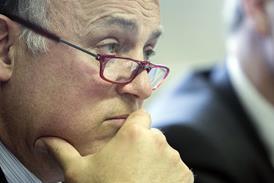- Foundation trust unable to how much it spent sending patients to private sector
- St George’s slid into deficit soon after acquiring FT status and forecasts £50m overspend in 2015-16
- Auditors’ report criticises “lack of oversight on a trust-wide basis”
FINANCE: A teaching hospital forecasting a £50m deficit this year does not know how much it spent sending patients to be treated in the private sector, HSJ can reveal.
A report into how St George’s University Hospitals Foundation Trust fell into a sudden deficit after becoming an FT last year, seen by HSJ, reveals it spent at least £6.9m with private hospitals to ease its own waiting list – but financial systems were not good enough to tell if it spent more.

Auditors from PwC investigated the south London trust last year and found poor control of spending at division level, which was not effectively held to account by the board.
It had originally predicted a surplus of £5.6m for 2014-15 but this became a deficit of £16.8m, with overspends of £10m for pay and £29.9m for non-pay, which included money spent with the private sector.
The report, which has not been publicly released, said: “The financial management team were unable to provide us with invoices processed for the purchase of non-NHS healthcare matched against the period to which they relate, as the majority of cases are invoiced as part of a framework agreement.
“We have therefore been unable to perform analysis on the accuracy of the accrued accounts.”
The audit firm’s report said two private companies, whose names were redacted in the version of the report HSJ saw, accounted for £5.3m of spending.
The 350-page document indicated that the total number of NHS patients sent to private providers by the trust went from 841 in 2013-14 to 1,060 in 2014-15.
It said: “When looking at the profile of the [outsourcing] costs incurred by the four clinical divisions, it is apparent that costs incurred do not match the profile of the patients treated.
“We experienced difficulty in understanding the basis of the accrual calculation and it appeared that an over-reliance was placed on information provided by the general managers.”
Some of these staff left before PwC could interview them.
The report said: “It has not been possible to calculate the actual loss suffered across the 1,060 patients.”
The treatments included bariatric, cardiac and neurosurgery procedures, the report said.
Extracts from PwC’s damning report
The trust has withheld PwC’s report. It said releasing it would breach commercial confidentiality but allowed HSJ to read a version with redactions at its foundation trust membership office last week. Here are some of the most revealing extracts.
- “During 2014-15 [redacted company names] accounted for £4m and £1.3m respectively of the £6.9m cost incurred in 2014-15 and therefore these costs significantly contributed to the annual overspend.”
- “During the course of our work we have not been able to obtain information in respect of the medicine and cardiac division’s budget for 2014-15; we understand that the general manager has left the trust and the information is no longer available.”
- “We have also sought to obtain information to show, for 2014-15, the predicted number of patients for 2014-15, expected capacity and the anticipated number of patients to be treated offsite due to a lack of ‘internal’ capacity. We have not seen such information.”
- “The trust has produced an analysis which shows that, for each cardiac surgery procedure sent offsite to [redacted provider], the trust incurred a loss of approximately £3,500. If this is used as a proxy for all offsite activity, the approximate loss from the 1,060 procedures carried out offsite within private care for 2014-15 would be some £3.7m. We are informed that the trust would not expect to suffer such a loss on the non-cardiac offsite surgery and, as such, the £3.7m represents a higher level of loss than the trust considers it has suffered.
- “However it has not been possible to calculate the actual loss suffered across the 1,060 patients.”
PwC criticised the trust in a number of other areas. The auditors concluded: “The management team failed in their responsibility to identify significant weaknesses in the trust’s financial systems and controls and this contributed to poor information being presented to both management and the board which was then used to make decisions.
“With better financial and operational information and significantly improved financial management and control the trust could have identified the drivers for decline earlier and taken more appropriate action.
“The trust’s inability to link its operational performance to its finances was key to it not taking sufficiently prompt action to manage its finances in a changing operational environment.”
The report said it was unusual for the finance and performance committee to be chaired by the trust’s overall chair. Christopher Smallwood left the trust last month and there are plans for an overhaul of the finance department.
PwC’s report said: “In our view, throughout the financial year there were a number of red flags reported to the [finance and performance committee] and the board, which if interpreted differently could have led the trust to identify the outturn deficit at an earlier stage.”
Another element of non-pay spending where there were significant problems was the “consultancy services” category, which overspent by £5.2m.
The report said: “The trust overspent by some £5.2m in ‘consultancy services’, which incorporated a number of different costs, including IT costs, professional services and consultancy costs. In addition some payroll costs, including those in respect of agency staff and external contractors, were included in consultancy services, although they should have been reported within pay.
“In our view there was a lack of oversight on a trust-wide basis from the finance team in respect of this category of expenditure.”
The auditors said the finance department had experienced “low” staff turnover, but the “benefit of significant experience is offset by a lack of fresh perspective and challenge on the methods used by these teams. In our view greater external input is likely to bring greater rigour and control.”
Source
PwC report
Source date
February 2016

























2 Readers' comments